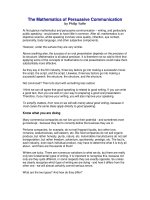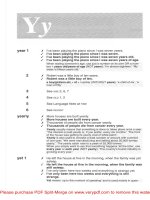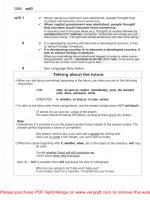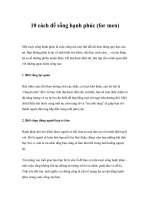Tài liệu Taking Care of Your Speaking Voice:"Tips and Exercises for Teachers " ppt
Bạn đang xem bản rút gọn của tài liệu. Xem và tải ngay bản đầy đủ của tài liệu tại đây (1.71 MB, 4 trang )
1
Taking Care of Your Speaking Voice:
Tips and Exercises for Teachers
by Rosemary Scott Vohs, Western Washington University
Tips for general health of throat and larynx:
1. Hydration
• Drink plenty of water throughout the day to keep your larynx hydrated.
• Have water or herbal tea at hand to sip during extended teaching.
• Breathe in steam from tea to moisten larynx.
• Suck on hard candy, mints or Slippery Elm lozenges. Avoid menthol.
• Avoid milk, or too much caffeinated tea or coffee while speaking.
2. Breathing
• Breathe fully from the base of your lungs using diaphragmatic breathing.
• Practice exhaling slowly and with control and support.
3. Vocal exercises
• Strengthen your voice and improve your vocal inflection and resonance.
• Monotone and coarse voices cause stress to larynx and vocal folds.
• Good articulation reduces tension and increases projection.
• Warm up by humming, singing, stretching and yawning.
4. Posture and movement
• Stand tall to improve airflow and effective breathing.
• Move around and gesture to relax body, neck and shoulders.
5. Rest your voice
• Try to rest your voice before and after speaking.
• Alternate your speaking with class activities to give voice brief rests.
• Use non-verbal signals to gain student’s attention, avoiding shouting.
6. Avoid damaging actions
• Avoid yelling – tightening your throat causes excessive friction to larynx
• Reduce extended loud speaking – use a microphone to aid volume.
• Don’t try to compete with background noise - move closer to audience.
• Avoid prolonged speaking if you have a cold or a sore throat.
• Avoid harsh coughing - clear throat gently or sip fluids to sooth throat.
•
Avoid gargling with alcohol-based mouthwash.
• Don’t smoke. Reduce speaking in smoky
or dusty environments.
Your voice as an instrument:
Every instrument has an
• energizer
• vibrator
• resonator
• By understanding the elements of your own
vocal instrument (and practicing it) you can improve the strength, stamina,
flexibility and expression of your voice.
• You will also find that your listeners find you more interesting to listen to and
subsequently your teaching will be more inspiring and effective.
2
Exercises:
1. Relax the shoulders and body
• Hold arms straight out. Swing arms and torso slowly from side to side.
• Roll shoulders. Lift them up and down, round and round.
• Roll head slowly forward from one shoulder to the other and back.
• Tense fists, arms, face, buttocks, legs and toes. Relax. Repeat.
• Lift arms above head. Breath in deeply. Exhale slowly while dropping arms.
2. Ease the tension from face and jaw, and open your throat
• Stretch your face by lifting eyebrows and opening mouth wide.
Scrunch face in by frowning and pursing lips. Repeat.
• Yawn, with exaggeration. Say, “Yah, yah, yah
”.
• Stretch mouth, with exaggeration by saying, “Eee, ooo, eee, ooo
”.
• With wide open mouth and throat, holding vowels, say,
“Hellooooo! How are yooooou, todaaaaay?… Iiiii’m fiiiiine!”
3. Breath and project effectively
• Stand tall and breath by expanding lower ribs (diaphragmatic breathing)
• Say, “Hoo, Ho, Ha, Hey” with diaphragmatic support. Try it at four varied
levels of volume: whisper, voiced whisper, comfortable volume, and loud.
• Breath in deeply. Exhale for as long as possible through pursed lips.
• Say alphabet as many times as possible on one breath.
Concentrate on controlling airflow and making voice as resonant as possible.
•
Be dramatic! Using diaphragmatic support and open throat, say:
“Cry, God for Harry, England and Saint George” or
”Friends, Romans, countrymen, lend me your ears
”
“The moon never beams without bringing me dreams
”
“Once upon a midnight dreary, whilst I slept on weak and weary
”
4. Articulate carefully
• Practice articulation to relax jaw and produce clearer speech.
• Have fun with articulation practice – try tongue twisters (see p.4)
5. Develop vocal expression and inflection
• Be an instrument! Practice putting “melody” into your voice.
• Read poems or stories. Exaggerate inflection by using a variety of:
o pitch - voice high and low
o rate - voice fast and slow
o force - voice loud and soft
Resources:
The Storyteller's Voice-Care Toolkit by Doug Lipman,
Voice Power: Using Your Voice to Captivate, Persuade, and Command Attention
by Renee Grant-Williams
Speak To Influence: How to unlock the hidden power of your voice by Susan Berkley
Speaking Clearly: Improving Voice and Diction by Jeffrey C. Hahner
The Complete Voice and Speech Workout : 75 Exercises for Classroom and Studio Use
by Janet Rodgers
Numerous internet resources: Search for Voice Care or Vocal Exercises.
3
Put it all together –
Practice breathing, projection, expression and articulation while reading:
I am the very model of a modern Major-General,
I’ve information vegetable, animal, and mineral,
I know the kings of England, and I quote the fights historical
From Marathon to Waterloo, in order categorical;
I’m very well acquainted, too, with matters mathematical,
I understand equations, both the simple and quadratical,
About binomial theorem I’m teeming with a lot o’ news –
With many cheerful facts about the square of the hypotenuse.
I’m very good at integral and differential calculus;
I know the scientific names of beings animalculous:
In short, in matters vegetable, animal, and mineral,
I am the very model of a modern Major-General.
I know our mythic history, King Arthur’s and Sir Caradoc’s;
I answer hard acrostics, I’ve a pretty taste for paradox,
I quote in elegiacs all the crimes of Heliogabalus,
In conics I can floor peculiarities parabolous;
I can tell undoubted Raphaels from Gerard Dows and Zoffanies,
I know the croaking chorus from the Frogs of Aristophanes!
Then I can hum a fugue of which I’ve heard the music’s din afore,
And whistle all the airs from that infernal nonsense Pinafore
Then I can write a washing bill in Babylonic cuneiform,
And tell you every detail of Caractacus’s uniform:
In short, in matters vegetable, animal, and mineral,
I am the very model of a modern Major-General.
In fact, when I know what is meant by "mamelon” and “ravelin”,
When I can tell at sight a Mauser rifle from a javelin,
When such affairs as sorties and surprises I’m more wary at,
And when I know precisely what is meant by “commissariat”,
When I have learnt what progress has been made in modern gunnery,
When I know more of tactics than a novice in a nunnery;
In short, when I’ve a smattering of elemental strategy,
You’ll say a better Major-General has never sat a gee
For my military knowledge, though I’m plucky and adventury,
Has only been brought down to the beginning of the century;
But still, in matters vegetable, animal, and mineral,
I am the very model of a modern Major-General.
(W. S. Gilbert, from The Pirates of Penzance)
4









